Module6 A trip to the zoo复习课件(共23张PPT)
文档属性
| 名称 | Module6 A trip to the zoo复习课件(共23张PPT) | 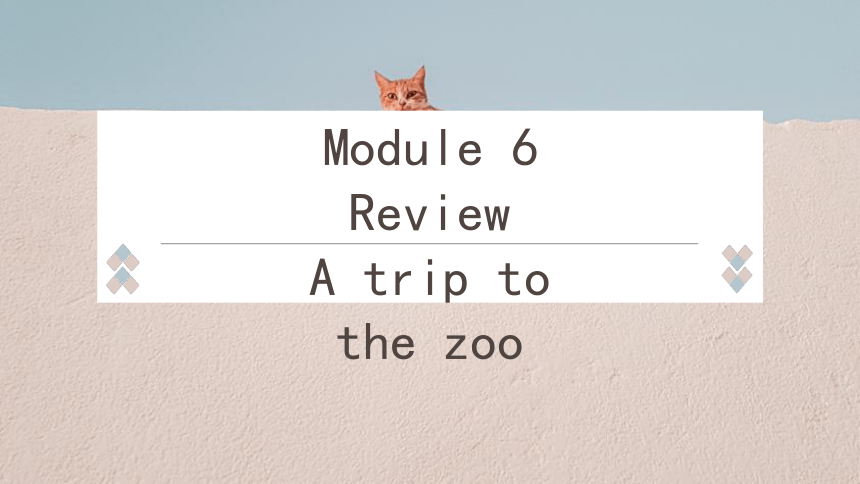 | |
| 格式 | zip | ||
| 文件大小 | 4.3MB | ||
| 资源类型 | 教案 | ||
| 版本资源 | 外研版 | ||
| 科目 | 英语 | ||
| 更新时间 | 2022-07-20 13:03:46 | ||
图片预览

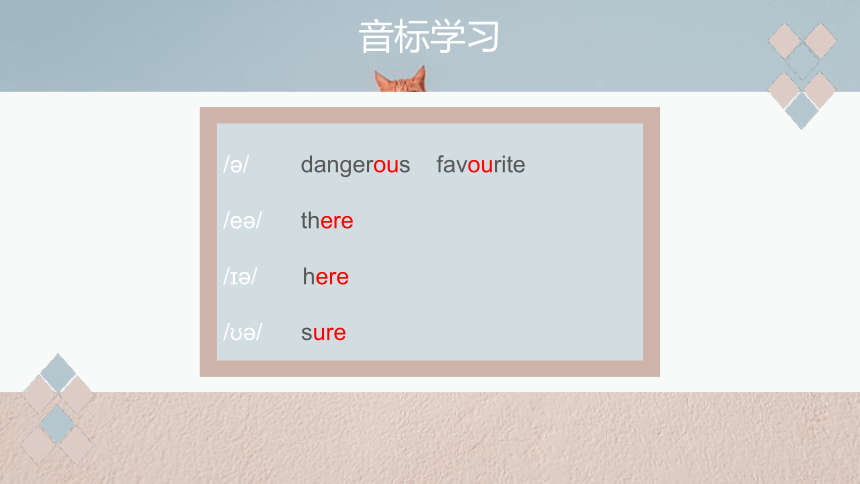
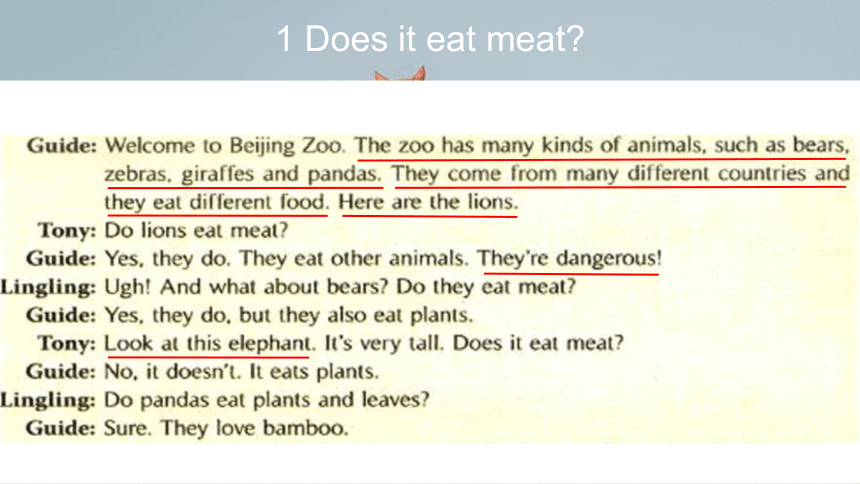
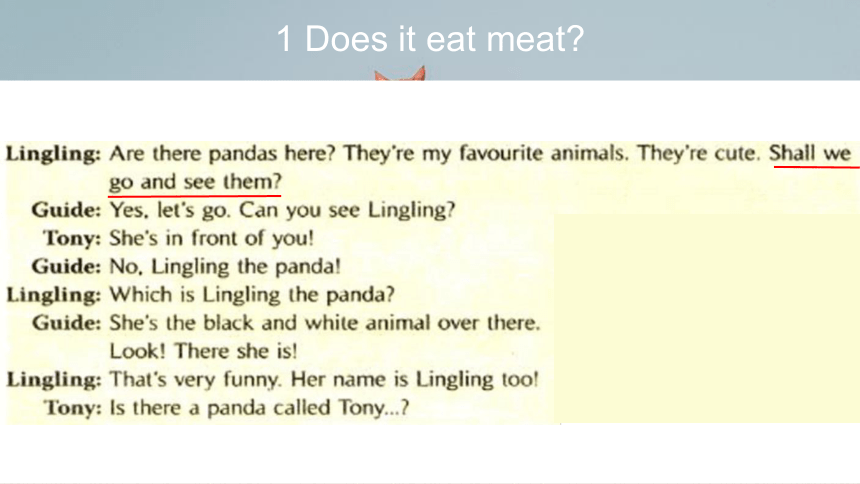
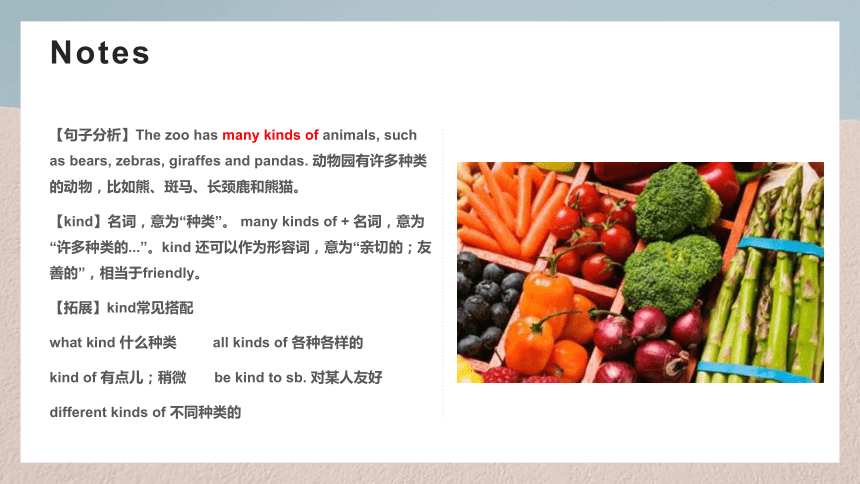
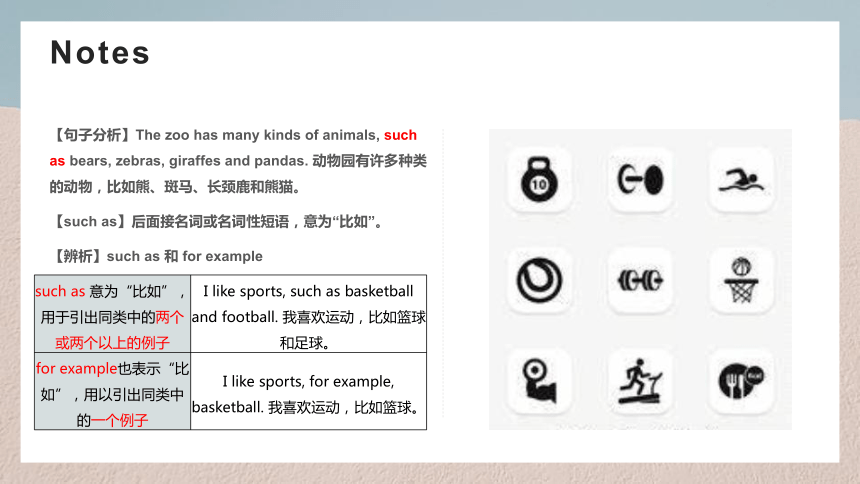
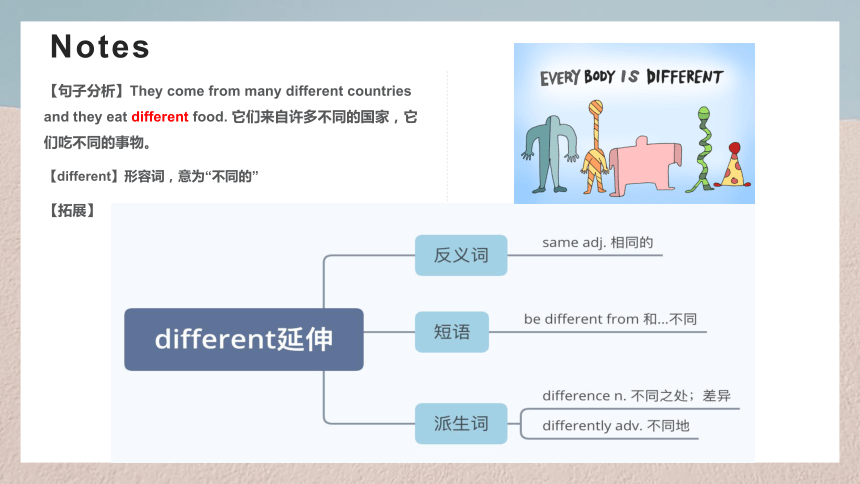
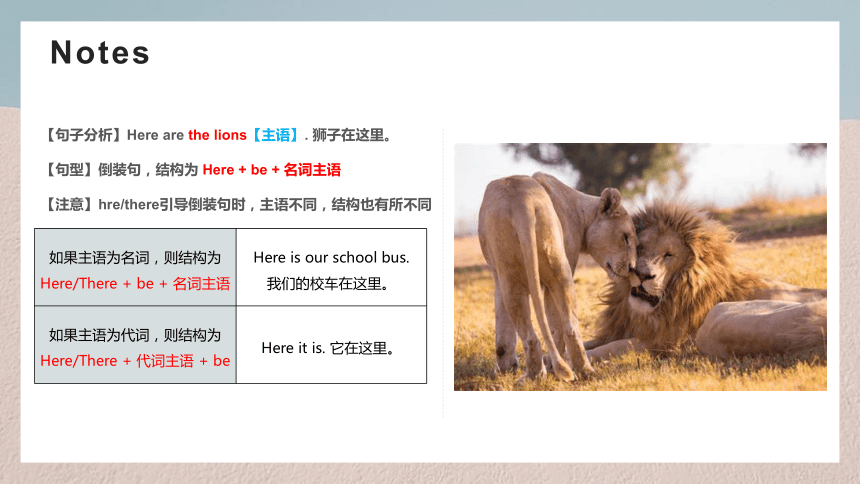
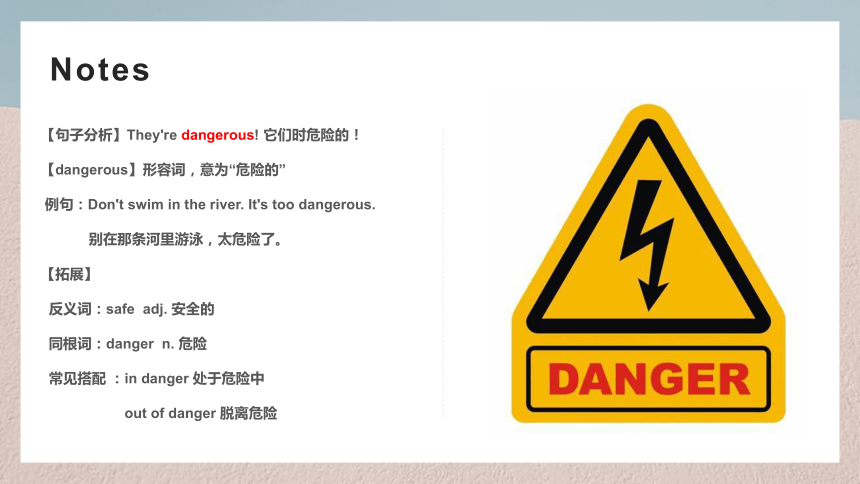
文档简介
(共23张PPT)
Module 6 Review
A trip to the zoo
/ / dangerous favourite
/e / there
/ / here
/ / sure
音标学习
1 Does it eat meat
1 Does it eat meat
【句子分析】The zoo has many kinds of animals, such as bears, zebras, giraffes and pandas. 动物园有许多种类的动物,比如熊、斑马、长颈鹿和熊猫。
【kind】名词,意为“种类”。 many kinds of + 名词,意为“许多种类的...”。kind 还可以作为形容词,意为“亲切的;友善的”,相当于friendly。
【拓展】kind常见搭配
what kind 什么种类 all kinds of 各种各样的
kind of 有点儿;稍微 be kind to sb. 对某人友好
different kinds of 不同种类的
Notes
【句子分析】The zoo has many kinds of animals, such as bears, zebras, giraffes and pandas. 动物园有许多种类的动物,比如熊、斑马、长颈鹿和熊猫。
【such as】后面接名词或名词性短语,意为“比如”。
【辨析】such as 和 for example
Notes
such as 意为“比如”,用于引出同类中的两个或两个以上的例子 I like sports, such as basketball and football. 我喜欢运动,比如篮球和足球。
for example也表示“比如”,用以引出同类中的一个例子 I like sports, for example, basketball. 我喜欢运动,比如篮球。
Notes
【句子分析】They come from many different countries and they eat different food. 它们来自许多不同的国家,它们吃不同的事物。
【different】形容词,意为“不同的”
【拓展】
【句子分析】Here are the lions【主语】. 狮子在这里。
【句型】倒装句,结构为 Here + be + 名词主语
【注意】hre/there引导倒装句时,主语不同,结构也有所不同
Notes
如果主语为名词,则结构为 Here/There + be + 名词主语 Here is our school bus.
我们的校车在这里。
如果主语为代词,则结构为 Here/There + 代词主语 + be Here it is. 它在这里。
【句子分析】They're dangerous! 它们时危险的!
【dangerous】形容词,意为“危险的”
例句:Don't swim in the river. It's too dangerous.
别在那条河里游泳,太危险了。
【拓展】
反义词:safe adj. 安全的
同根词:danger n. 危险
常见搭配 :in danger 处于危险中
out of danger 脱离危险
Notes
【句子分析】Look at this elephant. 看看这只大象。
【look at】look是不及物动词,其后若跟宾语,要加at.
Notes
【句子分析】Shall we go and see them 我们去看看它们,好吗?
【结构】Shall we + 动词原形... 意为“...好吗?” 通常用于发出邀请。若接受邀请,可以使用“Sure./Good idea./That sounds great.”等来回答;如果拒绝邀请,可以使用“No, thanks./Sorry.”等来回答。
例句:- Shall we go out for a walk 我们去散步好吗?
- That's a good idea. 真是个好主意。
Notes
【bear】/be (r)/ n. 熊
【elephant】/ el f nt/ n. 大象
【giraffe】/d rɑ f/ n. 长颈鹿
【lion】/ la n/ n. 狮子
【monkey】/ m ki/ n. 猴子
【panda】/ p nd / n. 熊猫
【tiger】/ ta ɡ (r)/ n. 老虎
【zoo】/zu / n. 动物园
Vocabulary
2 The tiger lives in Asia.
2 The tiger lives in Asia.
【句子分析】It eats plants and a little fruit, but it doesn't eat meat. 它吃植物和少量水果,但它不吃肉。
【a little】意为“少量”,用来修饰不可数名词。
例句:There is a little water in the bittle.
瓶子里还有少量的水。
【拓展】a little 还有“有点儿;稍微”之意,相当于a little bit/ a bit/ kind of, 用来修饰形容词或副词。
例句:I feel a little/ a little bit/ kind of tired.
我觉得有点累。
Notes
【辨析】few, a few, little, a little
意义/功能 修饰复数可数名词 修饰不可数名词
否定(几乎没有,少) few little
肯定(有些,一些) a few a little
【句子分析】It's strong and catches many kinds of animals for food. 它很强壮,能抓住许多种类的动物当食物。
【catch】 动词,意为“抓住;接住”
例句:I didn't catch the ball. 我没有抓住球。
【拓展】动词,还有“赶上”的意思
例句:He is late because he doesn't catch the bus.
他迟到了,因为他没赶上公车。
【过去式】caught, 动词不规则变化
Notes
【语法】行为动词的一般现在时(二)
当主语是第三人称单数时,在肯定句中要用动词的第三人称单数形式。
Notes
【拓展】动词第三人称单数的变化规律
一般情况下,直接在动词词尾加-s work - works
take - takes
以为s/x/sh/ch/o结尾的动词,在词尾加-es finish - finishes
teach - teaches
以辅音字母 + y结尾的动词,先把y变为i,再加-es study - studies
fly - flies
其他 have - has
be -is
【辨析1】look, see, watch, read 都和“看”有关,但区别如下:
look 表示“看”,强调“看”的动作;是不及物动词,其后若跟宾语,要用look at She looks at me and smiles.
see 强调“看”的结果,意为“看见;看到” I see three birds in the sky.
watch 强调“专注地看”,有欣赏的意味,常用于看电视、看球赛等 Let's watch a football match.
read 指“阅读”,常用于看书、看报等 She likes reading books.
易错易混全解
【辨析2】other, the other, others, the others, another
other 表示“别的,另外的” 与复数名词连用时相当于others Some students like English and other students ( = others) like maths.
the other 表示“两个中的另一个”,表示特指 He has two sisters. One is Mary and the other is Lily.
others 是没有明确范围的“另外的人或事” She often help others.
the others 表示“其余的”,指的是一定范围内“所有其余的人或事物”,是特指 Some students in my class like English and the others like maths.
another 表示“三个或三个以上中任意的另一个”,表示泛指 Could you please show me another hat
易错易混全解
【辨析3】too, either, also, as well
too too通常放在句子末尾 I like the movie. She likes it, too.
either either用在否定句中,放在句子句末,通常用逗号隔开 I don't like the movie. She doesn't like it, either.
also also放在be动词、助动词或情态动词之后,行为动词之前 I like the movie. She also likes it.
as well as well用在肯定句中,放在句子末尾 I like the movie. She likes it as well.
易错易混全解
【辨析4】alone, lonely
alone 可以作形容词“单独的;独自的”,也可以作副词“独自地”,强调独自一人 She is alone at home. (强调独自一人在家)
lonely 只能作形容词,意为“孤独的;寂寞的”,强调寂寞、孤独 The old man lives alone and he feels lonely. (独居所以感到孤独)
易错易混全解
3 Language in use
1. Here ________ the teacher's books.
A. have B. has C. are D. is
2. - Can you __________ my dog when I am on holiday, Tom . - Sure.
A. look at B. look for C. look like D. look after
3. She is very careful, so she makes very _________ mistakes.
A. little B. few C. a few D. a little
4. There are two trees in my backyard. One is a Chinese date tree (枣树). __________ is an apple tree.
A. The other B. Other C. Another D. Others
5. Kitty is from Beijing. Simon is from Beijing ________.
A. and B. also C. else D. too
C
D
B
A
D
Module 6 Review
A trip to the zoo
/ / dangerous favourite
/e / there
/ / here
/ / sure
音标学习
1 Does it eat meat
1 Does it eat meat
【句子分析】The zoo has many kinds of animals, such as bears, zebras, giraffes and pandas. 动物园有许多种类的动物,比如熊、斑马、长颈鹿和熊猫。
【kind】名词,意为“种类”。 many kinds of + 名词,意为“许多种类的...”。kind 还可以作为形容词,意为“亲切的;友善的”,相当于friendly。
【拓展】kind常见搭配
what kind 什么种类 all kinds of 各种各样的
kind of 有点儿;稍微 be kind to sb. 对某人友好
different kinds of 不同种类的
Notes
【句子分析】The zoo has many kinds of animals, such as bears, zebras, giraffes and pandas. 动物园有许多种类的动物,比如熊、斑马、长颈鹿和熊猫。
【such as】后面接名词或名词性短语,意为“比如”。
【辨析】such as 和 for example
Notes
such as 意为“比如”,用于引出同类中的两个或两个以上的例子 I like sports, such as basketball and football. 我喜欢运动,比如篮球和足球。
for example也表示“比如”,用以引出同类中的一个例子 I like sports, for example, basketball. 我喜欢运动,比如篮球。
Notes
【句子分析】They come from many different countries and they eat different food. 它们来自许多不同的国家,它们吃不同的事物。
【different】形容词,意为“不同的”
【拓展】
【句子分析】Here are the lions【主语】. 狮子在这里。
【句型】倒装句,结构为 Here + be + 名词主语
【注意】hre/there引导倒装句时,主语不同,结构也有所不同
Notes
如果主语为名词,则结构为 Here/There + be + 名词主语 Here is our school bus.
我们的校车在这里。
如果主语为代词,则结构为 Here/There + 代词主语 + be Here it is. 它在这里。
【句子分析】They're dangerous! 它们时危险的!
【dangerous】形容词,意为“危险的”
例句:Don't swim in the river. It's too dangerous.
别在那条河里游泳,太危险了。
【拓展】
反义词:safe adj. 安全的
同根词:danger n. 危险
常见搭配 :in danger 处于危险中
out of danger 脱离危险
Notes
【句子分析】Look at this elephant. 看看这只大象。
【look at】look是不及物动词,其后若跟宾语,要加at.
Notes
【句子分析】Shall we go and see them 我们去看看它们,好吗?
【结构】Shall we + 动词原形... 意为“...好吗?” 通常用于发出邀请。若接受邀请,可以使用“Sure./Good idea./That sounds great.”等来回答;如果拒绝邀请,可以使用“No, thanks./Sorry.”等来回答。
例句:- Shall we go out for a walk 我们去散步好吗?
- That's a good idea. 真是个好主意。
Notes
【bear】/be (r)/ n. 熊
【elephant】/ el f nt/ n. 大象
【giraffe】/d rɑ f/ n. 长颈鹿
【lion】/ la n/ n. 狮子
【monkey】/ m ki/ n. 猴子
【panda】/ p nd / n. 熊猫
【tiger】/ ta ɡ (r)/ n. 老虎
【zoo】/zu / n. 动物园
Vocabulary
2 The tiger lives in Asia.
2 The tiger lives in Asia.
【句子分析】It eats plants and a little fruit, but it doesn't eat meat. 它吃植物和少量水果,但它不吃肉。
【a little】意为“少量”,用来修饰不可数名词。
例句:There is a little water in the bittle.
瓶子里还有少量的水。
【拓展】a little 还有“有点儿;稍微”之意,相当于a little bit/ a bit/ kind of, 用来修饰形容词或副词。
例句:I feel a little/ a little bit/ kind of tired.
我觉得有点累。
Notes
【辨析】few, a few, little, a little
意义/功能 修饰复数可数名词 修饰不可数名词
否定(几乎没有,少) few little
肯定(有些,一些) a few a little
【句子分析】It's strong and catches many kinds of animals for food. 它很强壮,能抓住许多种类的动物当食物。
【catch】 动词,意为“抓住;接住”
例句:I didn't catch the ball. 我没有抓住球。
【拓展】动词,还有“赶上”的意思
例句:He is late because he doesn't catch the bus.
他迟到了,因为他没赶上公车。
【过去式】caught, 动词不规则变化
Notes
【语法】行为动词的一般现在时(二)
当主语是第三人称单数时,在肯定句中要用动词的第三人称单数形式。
Notes
【拓展】动词第三人称单数的变化规律
一般情况下,直接在动词词尾加-s work - works
take - takes
以为s/x/sh/ch/o结尾的动词,在词尾加-es finish - finishes
teach - teaches
以辅音字母 + y结尾的动词,先把y变为i,再加-es study - studies
fly - flies
其他 have - has
be -is
【辨析1】look, see, watch, read 都和“看”有关,但区别如下:
look 表示“看”,强调“看”的动作;是不及物动词,其后若跟宾语,要用look at She looks at me and smiles.
see 强调“看”的结果,意为“看见;看到” I see three birds in the sky.
watch 强调“专注地看”,有欣赏的意味,常用于看电视、看球赛等 Let's watch a football match.
read 指“阅读”,常用于看书、看报等 She likes reading books.
易错易混全解
【辨析2】other, the other, others, the others, another
other 表示“别的,另外的” 与复数名词连用时相当于others Some students like English and other students ( = others) like maths.
the other 表示“两个中的另一个”,表示特指 He has two sisters. One is Mary and the other is Lily.
others 是没有明确范围的“另外的人或事” She often help others.
the others 表示“其余的”,指的是一定范围内“所有其余的人或事物”,是特指 Some students in my class like English and the others like maths.
another 表示“三个或三个以上中任意的另一个”,表示泛指 Could you please show me another hat
易错易混全解
【辨析3】too, either, also, as well
too too通常放在句子末尾 I like the movie. She likes it, too.
either either用在否定句中,放在句子句末,通常用逗号隔开 I don't like the movie. She doesn't like it, either.
also also放在be动词、助动词或情态动词之后,行为动词之前 I like the movie. She also likes it.
as well as well用在肯定句中,放在句子末尾 I like the movie. She likes it as well.
易错易混全解
【辨析4】alone, lonely
alone 可以作形容词“单独的;独自的”,也可以作副词“独自地”,强调独自一人 She is alone at home. (强调独自一人在家)
lonely 只能作形容词,意为“孤独的;寂寞的”,强调寂寞、孤独 The old man lives alone and he feels lonely. (独居所以感到孤独)
易错易混全解
3 Language in use
1. Here ________ the teacher's books.
A. have B. has C. are D. is
2. - Can you __________ my dog when I am on holiday, Tom . - Sure.
A. look at B. look for C. look like D. look after
3. She is very careful, so she makes very _________ mistakes.
A. little B. few C. a few D. a little
4. There are two trees in my backyard. One is a Chinese date tree (枣树). __________ is an apple tree.
A. The other B. Other C. Another D. Others
5. Kitty is from Beijing. Simon is from Beijing ________.
A. and B. also C. else D. too
C
D
B
A
D
同课章节目录
- Starte
- Module 1 My teacher and my friends
- Module 2 My English lesson
- Module 3 My English book
- Module 4 My everyday life
- Module 1 My classmates
- Unit 1 Nice to meet you.
- Unit 2 I'm Wang Lingling and I'm thirteen years ol
- Unit 3 Language in use.
- Module 2 My family
- Unit 1 Is this your mum?
- Unit 2 These are my parents.
- Unit 3 Language in use.
- Module 3 My school
- Unit 1 There are thirty students in my class.
- Unit 2 The library is on the left of the playgroun
- Unit 3 Language in use.
- Module 4 Healthy food
- Unit 1 We've got lots of apples.
- Unit 2 Is your food and drink healthy?
- Unit 3 Language in use.
- Module 5 My school day
- Unit 1 I love history.
- Unit 2 We start work at nine o'clock.
- Unit 3 Language in use.
- Revision module A
- Module 6 A trip to the zoo
- Unit 1 Does it eat meat?
- Unit 2 The tiger lives in Asia.
- Unit 3 Language in use.
- Module 7 Computers
- Unit 1 How do I write my homework on the computer?
- Unit 2 When do you use a computer?
- Unit 3 Language in use.
- Module 8 Choosing presents
- Unit 1 I always like birthday parties.
- Unit 2 She often goes to concerts.
- Unit 3 Language in use.
- Module 9 People and places
- Unit 1 We're enjoying the school trip a lot.
- Unit 2 They're waiting for buses or trains.
- Unit 3 Language in use.
- Module 10 Spring Festival
- Unit 1 Are you getting ready for Spring Festival?
- Unit 2 My mother's cleaning our houses and sweepin
- Unit 3 Language in use.
- Revision module B
